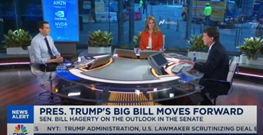NEW YORK CITY—Today, United States Senator Bill Hagerty (R-TN), a member of the Senate Appropriations, Banking, and Foreign Relations Committees and former U.S. Ambassador to Japan, joined Squawk Box on CNBC live in-studio to discuss the GENIUS Act vote in the Senate, the budget reconciliation package, and President Donald Trump’s ongoing trade negotiations.

Partial Transcript
Hagerty on the GENIUS Act: “It’s actually born from a great deal of frustration. We started working on the bill in earnest back in the fall, but we’ve watched what’s happened with the absence of any type of regulatory framework here in America. And what we see is this type of innovative technology moving offshore. The last thing I want to see is that I don’t want to see innovation leaving America. It’s all happening here right now. But what we saw was a lack of regulatory framework, which means a lack of certainty. And if you’re using enforcement actions from the [Securities and Exchange Commission], which was what has been happening for the past four years, to regulate the markets, it creates massive amounts of uncertainty. This will fix it […] It basically establishes a legal and regulatory framework to issue stablecoins here in America. Stablecoin is stable, meaning it’s backed by a certain currency. In this case it’s tied to the U.S dollar, but also, it’s backed either by cash or by short-term U.S. treasury securities. So, it’s entirely safe having that type of regulatory framework and disclosure around it so we know exactly what’s backing up these digital dollars, if you will, is going to be great.”
Hagerty on the difference between stablecoins and typical cryptocurrency:“This is a payment mechanism, and not to be confused with Bitcoin or something that has a speculative component. This puts us into a digital payment framework. The fastest rails available, much better than the system developed in the seventies and eighties, which is slow. It takes days to clear […] It’s not going to be [backed by] equities. It’s going to be high quality, short-term assets, either short-term U.S. treasuries or cash. I think the majority of it’ll be U.S. treasuries. In fact, what this will do, and the projections are by 2030, this is according to Citibank, stablecoin issuers will be the largest holders of U.S. treasuries in the world.”
Hagerty on opposition to the GENIUS Act: “No one in the industry is [opposing this legislation] and has to do with my colleagues. And basically, it’s gotten to be a question; we’ll find out tonight. We have broad policy agreement, Democrats and Republicans. The question is, can we get past the partisan politics and allow us to actually have a victory? I would enjoy having a bipartisan victory […] It’s politicians that want to see centralized control. And centralized control, if you want that, buy the digital yuan. I don’t want to see that happen here in America. I think it would be devastating for the dollar’s value as the reserve currency. This will actually perpetuate the dollar’s value as a reserve currency. It will extend that momentum. It’s going to extend demand for U.S. treasuries. There’s a lot to like about this.”
Hagerty on Moody’s U.S. credit downgrade highlighting the need to pass the budget reconciliation package: “I think it puts more pressure on us as well, over the next couple of weeks, to get this reconciliation bill done in a way that’s responsible and shows real progress against the deficit […] I’d certainly like to see [the bill passed] sooner, and so would my colleagues in the Senate […] [Treasury Secretary] Scott [Bessent’s] perspective on the market is born from his experience. I’ll just say the immediate impact is real, but I think the market’s going to digest this. The other rating agencies [have] already put us at this place, but what I want to see is the reconciliation package come through stimulation of capital investment. That capital investment will be at more jobs, more economic activity, that’s going to be good for revenue growth […] My colleagues in the Senate want to see significant cuts.”
Hagerty on the ongoing trade negotiations: “I think it’s coming much more clear. What we have is a system that’s a result of—you go back to the post World War II era, we put in place very favorable terms of trade. Countries like those in Europe, Japan, their economies were devastated. But we should have put a GDP-per-capita or a time limit on those. We didn’t. So, we wind up with these gross imbalances. For example, you build a car here in America, sell to Europe, ten percent tariff. They build one there, sell to us, two and a half percent. We’d never do that deal today. So, this sort of reciprocity is sorting itself out. We’ve had a deal struck with the UK; we’re in a good place with China.”
Hagerty on tariff impacts: “To the extent there is an increase, you’ve got the producer, you’ve got the shipper, you’ve got the middleman, the retailer, and you’ve got the consumer. All of them may bear some of that. But it’s not certain to me at all, that that’s where we’re going to head. We could head to lower tariffs around the board […] The president’s been working very hard with China to make sure we get this thing addressed as quickly as possible.”
###